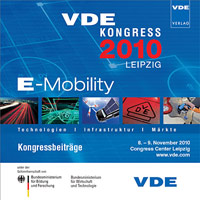Battery Optimisation in Electric Vehicles and Range Extended Electric Vehicles Based on Measured Individual Operational Profiles
Konferenz: VDE-Kongress 2010 - E-Mobility: Technologien - Infrastruktur - Märkte
08.11.2010 - 09.11.2010 in Leipzig, Deutschland
Tagungsband: VDE-Kongress 2010
Seiten: 6Sprache: EnglischTyp: PDF
Persönliche VDE-Mitglieder erhalten auf diesen Artikel 10% Rabatt
Autoren:
Waldowski, Paul; Schüppel, Fabian; Schindler, V. (Technische Universität Berlin, Germany)
Inhalt:
Today’s high battery costs are considered one of the major obstacles to the widespread deployment of electric mobility. Thus, the reduction of battery size in order to reduce vehicle costs is an important issue in the development of battery electric vehicles (BEVs). On the other hand, the range of today’s BEVs is seen as still insufficient for the private sector to use these vehicles on a large scale. The knowledge of the individual operational profiles and the use of simulation tools could help to identify the specific customer needs with regard to battery size. The transport sector with its clearly defined and constant operational profiles offers the opportunity to identify the required energy content. This paper aims to outline an approach designed for battery optimisation relying on a measurement technique with a small autarkic GPS data logging system, which has been developed at the Department of Automotive Engineering of the Technische Universität Berlin. The device called "veLOG" delivers not only the velocity profiles to calculate the energy requirement but also data on the car’s position in order to establish a charging infrastructure in locations convenient for both user and power authorities. Based on different scenarios with regard to charging strategies and involving automotive solutions such as the range extender, battery optimisation can be achieved by means of a reduction in energy content.


